 Westside Observer
Westside Observer
September 2014 at www.WestsideObserver.com
Civil Grand Jury on Ethics Commission
Ethics’ Pretenses vs. Sunshine
Article Printer-friendly
PDF file
 Westside Observer
Westside Observer
September 2014 at www.WestsideObserver.com
Civil
Grand Jury on Ethics Commission
Ethics’
Pretenses vs. Sunshine
by Patrick Monette-Shaw
The tenuous relationship between San Francisco’s Sunshine Ordinance Task Force and the City’s Ethics Commission was already the subject of an Ethics Commission complaint filed on June 22 involving probable inappropriate communications from an errant Task Force member to the Ethics Commission that appears to have contributed to conflicting rulings issued by the Ethics Commission.
The very next day, the San Francisco Civil Grand Jury coincidentally issued a blistering report on June 23 that is highly critical — once again — of the Ethics Commission.
Civil Grand Jury Faults Ethics Commission — Again
The 2010–2011 Civil Grand Jury issued a scathing 15-page report three years ago, titled “San Francisco’s Ethics Commission: The Sleeping Watch Dog,” highly critical of the excessive influence the Ethics Commission’s Executive Director, John St. Croix, holds over Ethics Commissioners, leading Commission members to abdicate oversight and their responsibilities to serve as an independent watchdog. The 2011 report contained seven findings and seven recommendations. A new Grand Jury report remains critical of the Ethics Commission.
Among other issues raised, the Jury’s June 2011 report focused heavily on the dismissal of all 18 Sunshine complaints referred by the Task Force to the Ethics Commission for enforcement between 2004 — the year St. Croix was first hired — and 2010. Each of the 18 cases was dismissed by the Executive Director; none was ever heard during an open hearing before the Ethics Commission. The Grand Jury’s report asserted the Commission’s Executive Director controls the “agenda” of the Ethics Commission, and reported that one Commissioner stated that there was an expectation that “… the Commission should support the Executive Director in his decisions to dismiss a case.”
St. Croix’s control over the Ethics Commission is a classic example of the tail wagging the dog — a Sleeping Watchdog. The Grand Jury noted its 2011 report was not meant to be a definitive report on the Ethics Commission; that report would be left to a future Grand Jury.
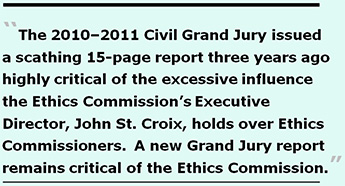 Grand Jury’s New Report on Ethics Commission
Grand Jury’s New Report on Ethics Commission
Fast forward to 2014. On June 23, the 2013–2014 Civil Grand Jury released a 43-page report (excluding several appendices) containing 45 findings, and 35 recommendations, titled “Ethics in the City: Promise, Practice or Pretense.”
Among other recommendations, the 2014 Grand Jury recommended a two-year pilot contract with California’s Fair Political Practices Commission to enforce violations of California Public Records Act and Sunshine Ordinance violations; an audit by the City Attorney of potential improper campaign contributions returned to the contributor, rather than forfeited to the City, as required by City laws; a recommendation that the Board of Supervisors enhance the “Citizen’s Right of Action” to enforce the City’s ethics law; a policy needs to be developed to preserve e-mails and text messages consistent with preservation of other public records; violations of departmental Statements of Incompatible Activities by City employees and members of boards and commissions should be disclosed; and enhancing the Form 700 Statements of Economic Interests City officials are required to submit to make them searchable. There are many more substantive issues raised in the Grand Jury’s 2014 report.
The Ethics Commission’s draft response to the 2014 Civil Grand Jury appears to have been authored by Mr. St. Croix. Of note, during its August 18 special meeting to discuss the Ethics Commission’s response to the Grand Jury, Ethics Commissioner Peter Keane — a widely respected Professor of Law and Dean Emeritus at Golden Gate University School of Law who was appointed to the Ethics Commission by City Attorney Dennis Herrera — observed that the draft response was too “defensive,” needed substantial edits, and that a “lot of the language in the proposed draft is inappropriate.” Finally, St. Croix’s excessive influence over the Ethics Commission appears to be gradually waning.
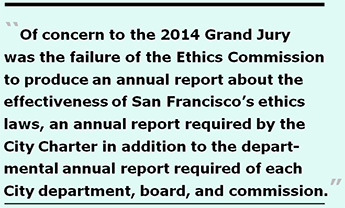 Of concern to the
2014 Grand Jury was the failure of the Ethics Commission to produce
an annual report about the effectiveness of San Francisco’s
ethics laws, an annual report required by the City Charter in
addition to the departmental annual report required of each City
department, and each board and commission. St. Croix’s draft
response to the Grand Jury claimed that the additional annual
report addressing effectiveness of ethics laws “was not necessary,”
and “implementation is not up to the Ethics Commission.”
Of concern to the
2014 Grand Jury was the failure of the Ethics Commission to produce
an annual report about the effectiveness of San Francisco’s
ethics laws, an annual report required by the City Charter in
addition to the departmental annual report required of each City
department, and each board and commission. St. Croix’s draft
response to the Grand Jury claimed that the additional annual
report addressing effectiveness of ethics laws “was not necessary,”
and “implementation is not up to the Ethics Commission.”
Initially Ethics Commissioner’s were poised on August 18 to allow St. Croix’s draft language to stand, until they took public comment and heard from both members of the public and members of the Civil Grand Jury, that the second report is required by the City Charter. Only then did the Ethics Commissioners decide to re-write St. Croix’s draft response, agreeing that the Ethics Commission should, in fact, develop and submit the supplemental annual report.
St. Croix’s Preservation of the Status Quo
The Grand Jury’s finding regarding the “Citizen’s Right of Action” involved a simple matter to enhance citizen’s rights to enforce all of the City’s ethics laws. But St. Croix’s inflammatory draft language recommended that the Ethics Commission disagree with the Jury’s finding and not implement it; he wrote, “absent a problem with the status quo, there is no compelling basis for specific enhancements.”
St. Croix further noted in the Commission’s draft response “To our knowledge, no one has ever attempted to use or even inquired about this right [the Citizen’s Right of Action].” St. Croix appears to have the mindset that so long as nobody ever attempted to use the right before, there’s no need to change the status quo.
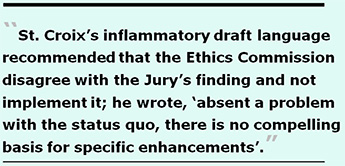 The status quo that
has developed at the Ethics Commission under St. Croix’s
decade-long tenure as Executive Director is troubling, in part
due to the status quo of his single-handed dismissal of the 18
Sunshine cases referred to Ethics for enforcement during the first
six years of his reign.
The status quo that
has developed at the Ethics Commission under St. Croix’s
decade-long tenure as Executive Director is troubling, in part
due to the status quo of his single-handed dismissal of the 18
Sunshine cases referred to Ethics for enforcement during the first
six years of his reign.
For his part, Commissioner Keane astutely noted during discussion of the recommendation on August 18, that the Citizen’s Right of Action is a “mom-and-apple-pie issue.” Keane asked, “Why would we disagree with a broader right of citizen’s access to ethics laws?” After lengthy discussion, the Commission voted to change the recommendation from “disagree,” to “agree,” and agreed to write the second report.
“Designated Filers” Escape Sunshine Training
The Grand Jury wrongly noted that all Form 700 “Statements of Economic Activities” are filed electronically. They are not. Only City Department Heads and members of boards and commissions are currently required to file their Form 700’s electronically; so-called “designated filers,” who file directly with their City departments, do not file electronically.
San Francisco’s Campaign and Governmental Conduct Code Sections 3.1-110 through 3.1-457 enumerates a total of 1,524 positions listed by working job titles as being required to file Form 700’s with either the Ethics Commission, or to their Departmental “Filing Officer.” Of those, just 533 were required to begin submitting them electronically to the Ethics Commission in April 2014.
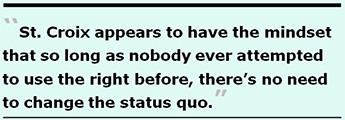 Of the 533, there
were just 57 City department heads and a few senior managers who
filed Form 700’s with Ethics (10.7%), 390 members of boards
and commissions filed with Ethics (73.2%), and another 86 (16.1%)
were filed with Ethics by filers who aren’t even enumerated
in the Governmental Code.
Of the 533, there
were just 57 City department heads and a few senior managers who
filed Form 700’s with Ethics (10.7%), 390 members of boards
and commissions filed with Ethics (73.2%), and another 86 (16.1%)
were filed with Ethics by filers who aren’t even enumerated
in the Governmental Code.
Sunshine Ordinance Section 67.33 requires Form 700 filers who file directly with the Ethics Commission to also submit an annual “Sunshine Ordinance Declaration” to the Ethics Commission. California Government Code Section 53235 requires Form 700 filers who file directly with the Ethics Commission to also submit a bi-annual “Certificate of Ethics Training.” There is no local regulation requiring other types of Form 700 filers to take either of the two trainings.
This effectively means that approximately 1,077 (fully 70.7%) of the 1,524 positions enumerated in the Governmental Conduct Code who are “designated” filers do not file electronically. No date has been set as to when the 1,077 “designated” filers will be required to start filing electronically, or with whom. Designated filers are not required to submit annual statements that they’ve taken Sunshine Ordinance Training, or that they’ve taken the bi-annual Ethics Training required of those who file directly with the Ethics Commission. That’s a significant number of City employees who receive little training on Sunshine requirements.
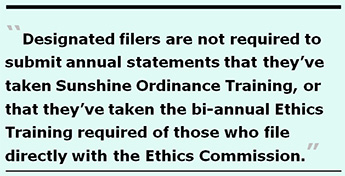 In fact, of the 37,606
City employees in the City Controller’s payroll database
for CY 2013, fully 37,549 file neither Form 700’s nor are
required to take Sunshine and Ethics training — 99.98% of
all City employees with no such requirement. Only 57 of the City’s
37,606 City employees — less than two-tenths of one percent
— have such a requirement. It appears 37,549 City employees
may never receive any notice that they are required to comply
with the Sunshine Ordinance.
In fact, of the 37,606
City employees in the City Controller’s payroll database
for CY 2013, fully 37,549 file neither Form 700’s nor are
required to take Sunshine and Ethics training — 99.98% of
all City employees with no such requirement. Only 57 of the City’s
37,606 City employees — less than two-tenths of one percent
— have such a requirement. It appears 37,549 City employees
may never receive any notice that they are required to comply
with the Sunshine Ordinance.
Ethics Commission Rejected More From St. Croix’s Draft Response
Among other changes described above, the Ethics Commission reversed more of St. Croix’s draft responses, including:
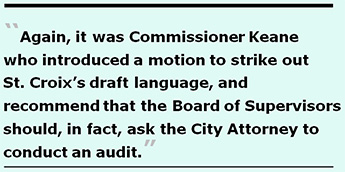 The Grand Jury made
a number of recommendations regarding Form 700 Statement of
Economic Interests that are filed after the required April
1 deadline, specifically noting that the Ethics Commission should
recommend dismissal for any officer or employee who fails to
file their Form 700 within 90 days after the deadline (Recommendation
14b), and should recommend dismissal for employees who file inaccurate
Form 700’s (Recommendation 14c). The Grand Jury also recommended
that all Form 700 filers — including “designated filers”
who currently only submit their Form 700 to their departmental
filing officer — be required to file them with the Ethics
Commission (Recommendation 14d).
The Grand Jury made
a number of recommendations regarding Form 700 Statement of
Economic Interests that are filed after the required April
1 deadline, specifically noting that the Ethics Commission should
recommend dismissal for any officer or employee who fails to
file their Form 700 within 90 days after the deadline (Recommendation
14b), and should recommend dismissal for employees who file inaccurate
Form 700’s (Recommendation 14c). The Grand Jury also recommended
that all Form 700 filers — including “designated filers”
who currently only submit their Form 700 to their departmental
filing officer — be required to file them with the Ethics
Commission (Recommendation 14d).Ethics Commission Fails to Correct Other Flaws in St. Croix’s Draft Response
 Although Commissioner
Keane astutely introduced motions to change many of St. Croix’s
inflammatory draft responses, several glaring mistakes went unchallenged:
Although Commissioner
Keane astutely introduced motions to change many of St. Croix’s
inflammatory draft responses, several glaring mistakes went unchallenged:
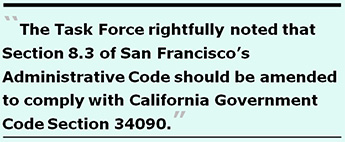 The Ethics Commission
also got it wrong on this point, because even the City Attorney’s
misguided Good
Government Guide updated on September 3, 2014 —
which Commissioner Keane has previously indicated carries no
force of law, and is merely an advisory document — clearly
notes on page 113 regarding records retention schedules, that
State law (citing Government Code Section 34090) “sets a
’floor’ for records retention” of two years.
The Ethics Commission
also got it wrong on this point, because even the City Attorney’s
misguided Good
Government Guide updated on September 3, 2014 —
which Commissioner Keane has previously indicated carries no
force of law, and is merely an advisory document — clearly
notes on page 113 regarding records retention schedules, that
State law (citing Government Code Section 34090) “sets a
’floor’ for records retention” of two years. 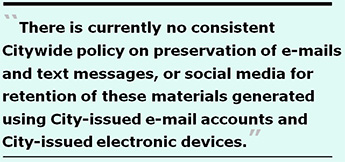 Whatever outcome
of the Supreme Court case regarding personal devices used to
conduct official City business, the fact remains that there is
currently no consistent Citywide policy on preservation of e-mails
and text messages, or social media content on City-funded social
media accounts, for retention of these materials generated using
City-issued e-mail accounts and City-issued electronic devices.
Whatever outcome
of the Supreme Court case regarding personal devices used to
conduct official City business, the fact remains that there is
currently no consistent Citywide policy on preservation of e-mails
and text messages, or social media content on City-funded social
media accounts, for retention of these materials generated using
City-issued e-mail accounts and City-issued electronic devices.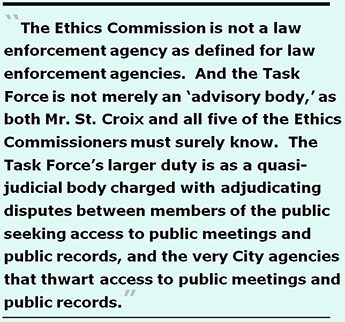 San Francisco’s
Ethics Commission is not a law enforcement agency as defined
for law enforcement agencies. At best, it is an advisory or
oversight body that enforces campaign and government conduct
laws, but that does not make Ethics a law enforcement agency.
Were the Ethics Commission a law enforcement agency, so too
would the Sunshine Task Force be, since the Task Force also was
created to adjudicate violations of our Sunshine laws.
San Francisco’s
Ethics Commission is not a law enforcement agency as defined
for law enforcement agencies. At best, it is an advisory or
oversight body that enforces campaign and government conduct
laws, but that does not make Ethics a law enforcement agency.
Were the Ethics Commission a law enforcement agency, so too
would the Sunshine Task Force be, since the Task Force also was
created to adjudicate violations of our Sunshine laws.Ethics Commission Rejects Two Key Issues or Concern to the Grand Jury
The Ethics Commission rejected two key issues raised by the Grand Jury:
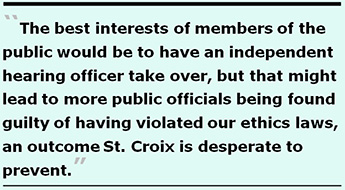 Again, the Ethics
Commission’s response to the Grand Jury was:
Again, the Ethics
Commission’s response to the Grand Jury was: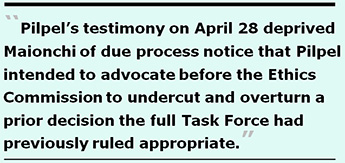 The
Ethics Commission may want to preserve the City’s status
quo by retaining the current authority to appointment both Ethics
Commissioners and members of the Sunshine Ordinance Task Force.
Appointees chosen by the Mayor, Board of Supervisors, and the
City Attorney are easier to control than an independent hearing
officer. After all, an independent hearing officer may be a wild
card the Mayor and Board of Supervisors don’t want established
who might find and uphold violations of our ethics laws by City
officials.
The
Ethics Commission may want to preserve the City’s status
quo by retaining the current authority to appointment both Ethics
Commissioners and members of the Sunshine Ordinance Task Force.
Appointees chosen by the Mayor, Board of Supervisors, and the
City Attorney are easier to control than an independent hearing
officer. After all, an independent hearing officer may be a wild
card the Mayor and Board of Supervisors don’t want established
who might find and uphold violations of our ethics laws by City
officials.
A Waywlard Sunshine Task Force Member
On April 28, 2014 Sunshine Ordinance Task Force member David Pilpel appears to have violated the Statement of Incompatible Activities (SIA) applicable to Task Force members when he spoke during the public comment period on a matter under discussion by the Ethics Commission that was referred by the SOTF for enforcement, by introducing himself as “David Pilpel, member of the Sunshine Ordinance Task Force.”
The SIA applicable to Pilpel clearly provides that no officer may hold himself or herself out as a representative of the Task Force, or as an agent acting on behalf of the Task Force, unless authorized to do so. Pilpel had not requested or received a waiver known as an Advance Written Determination from either the Board of Supervisors, or from the Ethics Commission, exempting him from this SIA prohibition.
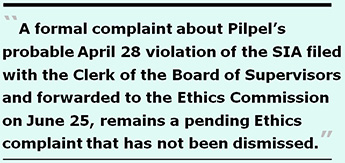 Pilpel appears to
have directly interfered with the Task Force’s referral of
Sunshine complaint #12-058, Dominic Maionchi vs. Recreation
and Parks Department to the Ethics Commission in a case involving
Rec and Park’s General Manager Phil Ginsburg over failure
to release public documents regarding leases of boat slips. Pilpel’s
testimony on April 28 deprived Maionchi of due process notice
that Pilpel intended to advocate before the Ethics Commission
to undercut and overturn a prior decision the full Task Force
had previously ruled appropriate. Pilpel’s testimony on
April 28 helped convince the Ethics Commission to reject the complaint and return it to the
Task Force for having named the so-called “wrong actor”
(Department Head Ginsburg) in SOTF’s referral for enforcement
to Ethics. Pilpel’s testimony ended up letting Ginsburg
off the hook when the Ethics Commission ruled against Maionchi.
Pilpel appears to
have directly interfered with the Task Force’s referral of
Sunshine complaint #12-058, Dominic Maionchi vs. Recreation
and Parks Department to the Ethics Commission in a case involving
Rec and Park’s General Manager Phil Ginsburg over failure
to release public documents regarding leases of boat slips. Pilpel’s
testimony on April 28 deprived Maionchi of due process notice
that Pilpel intended to advocate before the Ethics Commission
to undercut and overturn a prior decision the full Task Force
had previously ruled appropriate. Pilpel’s testimony on
April 28 helped convince the Ethics Commission to reject the complaint and return it to the
Task Force for having named the so-called “wrong actor”
(Department Head Ginsburg) in SOTF’s referral for enforcement
to Ethics. Pilpel’s testimony ended up letting Ginsburg
off the hook when the Ethics Commission ruled against Maionchi.
Although Pilpel has fretted extensively about the due process rights of departmental respondents and the “actors” named as having violated the Sunshine Ordinance and their due process rights, when it comes to the due process rights of complainants, Pilpel appears to be not quite so interested. Pilpel provided no due process notification to Maionchi — or to his fellow SOTF members — that he, Pilpel, intended to advocate against the SOTF referral of Maionchi vs. Recreation and Parks on April 28 before the Ethics Commission.
A formal complaint about Pilpel’s probable April 28 violation of the SIA filed by this author on June 22 with the Clerk of the Board of Supervisors that was forwarded to the Ethics Commission on June 25, remains a pending Ethics complaint that has not been dismissed.
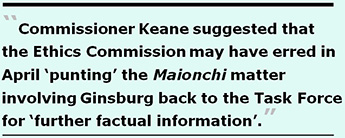 Notably, Ethics Commissioner
Peter Keane observed on July 28 — during Commissioner debate
and discussion on the separate, unrelated SOTF Mica Ringel
referral to Ethics for enforcement involving largely the same
issues in the Dominic Maionchi case — that the Ethics
Commission may have erred on April 28 when it found Ginsburg had
not violated the Sunshine Ordinance, after the Ethics
Commission determined on July 28 that in a very similar case,
John Rahaim, Director of the Planning Commission, had
violated the Sunshine Ordinance, essentially involving the same
underlying issue of naming department heads as ultimately responsible
for the actions or inactions of their subordinates. Keane suggested
that the Ethics Commission may have erred in April “punting”
the Maionchi matter involving Ginsburg back to the Task
Force for “further factual information.”
Notably, Ethics Commissioner
Peter Keane observed on July 28 — during Commissioner debate
and discussion on the separate, unrelated SOTF Mica Ringel
referral to Ethics for enforcement involving largely the same
issues in the Dominic Maionchi case — that the Ethics
Commission may have erred on April 28 when it found Ginsburg had
not violated the Sunshine Ordinance, after the Ethics
Commission determined on July 28 that in a very similar case,
John Rahaim, Director of the Planning Commission, had
violated the Sunshine Ordinance, essentially involving the same
underlying issue of naming department heads as ultimately responsible
for the actions or inactions of their subordinates. Keane suggested
that the Ethics Commission may have erred in April “punting”
the Maionchi matter involving Ginsburg back to the Task
Force for “further factual information.”
The Ethics Commission’s ruling sustaining the Task Force’s Order of Determination finding that Planning Director Rahaim had violated the Sunshine Ordinance was an historic moment, since it was just the second time that the Ethics Commission upheld a Task Force referral for enforcement, and was the first time that the Commission ruled a department head had, in fact, violated the Sunshine Ordinance. And the first time the Commission issued a cease-and-desist order involving Sunshine Ordinance violations.
Phil Ginsburg and “Further Factual Information”
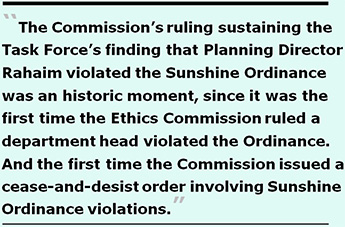 Four months after
the Ethics Commission referred the Maionchi matter back
to the Sunshine Task Force on April 28 for further factual information
about whether Phil Ginsburg was the properly-named respondent
in the Maionchi complaint, Ginsburg suddenly responded when the
matter was scheduled for preliminary re-review at the Sunshine
Task Force’s September 3 regularly-scheduled meeting.
Four months after
the Ethics Commission referred the Maionchi matter back
to the Sunshine Task Force on April 28 for further factual information
about whether Phil Ginsburg was the properly-named respondent
in the Maionchi complaint, Ginsburg suddenly responded when the
matter was scheduled for preliminary re-review at the Sunshine
Task Force’s September 3 regularly-scheduled meeting.
During the full year between May 1, 2013 (when the Task Force first heard Maionchi’s December 12, 2012 complaint) and April 28, 2014 when the Ethics Commission finally considered the Task Force’s referral for enforcement naming Ginsburg as responsible, Ginsburg had never appeared at either multiple Task Force hearings or at the Ethics Commission hearing, instead sending subordinates to fall on his sword during hearings to defend him.
So it was surprising that on September 3, Ginsburg finally submitted a letter to the Task Force defending himself for the first time, perhaps hoping he could influence the “further factual information” requested by the Ethics Commission. Ginsburg admits in the letter he was aware of Maionchi’s records request and subsequent Sunshine complaint, but that the records did not rise to the level of calling for the “time and attention of [Rec and Park’s] General Manager” and he was not personally involved in the redaction of information provided to Maionchi. Instead, Ginsburg asserts he is fully supportive of his staff who decided to redact the records provided to Maionchi. Ginsburg claims the redaction is consistent with “widespread City practices” guided by long-standing “public advice” in the City Attorney’s Good Government Guide.
Ginsburg twice referred in his September 3 letter that the Good Government Guide has long provided “public advice,” all but ignoring that the advice may not be accurate “legal advice,” and simply public advice. No matter how “long-standing” or “widespread” the practice has been doesn’t automatically justify the past practice, nor make the “public advice” valid legal advice. And Ginsburg may be unaware Ethics Commissioner Keane has stated publicly that the Good Government Guide carries absolutely no force of law. The Guide is a flawed guideline, not law.
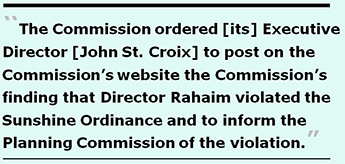 Observers now wonder
whether Ginsburg submitted his September 3 letter only after the
Ethics Commission issued its cease-and-desist letter against Planning
Director Rahaim finding that Department Heads are, of course,
responsible for the actions and inactions of their subordinates.
Others wonder whether Ginsburg only submitted his letter after
Commissioner Keane indicated on July 28 that the Ethics Commission
may have erred three months earlier in the Maionchi case
punting it back to the Task Force.
Observers now wonder
whether Ginsburg submitted his September 3 letter only after the
Ethics Commission issued its cease-and-desist letter against Planning
Director Rahaim finding that Department Heads are, of course,
responsible for the actions and inactions of their subordinates.
Others wonder whether Ginsburg only submitted his letter after
Commissioner Keane indicated on July 28 that the Ethics Commission
may have erred three months earlier in the Maionchi case
punting it back to the Task Force.
Could it be that Ginsburg is now worried that if the Task Force returns the Maionchi case back to the Ethics Commission asserting that the Ethics Commission can’t have it both ways ruling differently between the Maionchi case and the Ringel case, that Ginsburg may eventually be found by Ethics to have also violated the Sunshine Ordinance, just as Ethics found Rahaim had?
The Task Force asserted during its September 3 meeting that it will not re-adjudicate the entire matter again in light of Ginsburg’s unexpected September 3 letter, and will focus instead at its next meeting on how to respond to, and return the case to, Ethics.
A Second SIA Violation
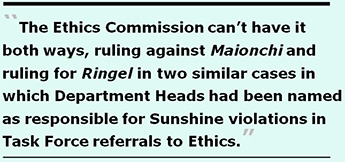 On July 28, 2014,
Member Pilpel again spoke before the Ethics Commission during
public comment on Sunshine complaint #13-024, Mica Ringel vs.
Planning Department being heard by the Commission. Although
Pilpel claimed to be speaking as an individual, within the first
minute-and-a-half of his testimony he switched from using the
first person “I,” into using multiple times the third
person “we,” again appearing to be speaking on behalf
of, and representing, the Task Force.
On July 28, 2014,
Member Pilpel again spoke before the Ethics Commission during
public comment on Sunshine complaint #13-024, Mica Ringel vs.
Planning Department being heard by the Commission. Although
Pilpel claimed to be speaking as an individual, within the first
minute-and-a-half of his testimony he switched from using the
first person “I,” into using multiple times the third
person “we,” again appearing to be speaking on behalf
of, and representing, the Task Force.
Pilpel again questioned whether the “right” actor had been referred to the Ethics Commission, and suggested he wasn’t sure City Departments could be named as having violated the Sunshine Ordinance, rather than naming an individual who may have violated the Sunshine Ordinance.
The Ethics Commission had none of it with Pilpel’s July 28 line of reasoning.
Instead, a nondescript, unprintable Enforcement Summary posting buried on the Ethics Commission web site notes that on July 28:
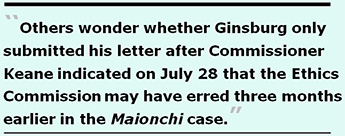 The Ethics Commission
can’t have it both ways, ruling against Maionchi and ruling
for Ringel in two similar cases in which Department Heads had
been named as responsible for Sunshine violations in Task Force
referrals to the Ethics Commission.
The Ethics Commission
can’t have it both ways, ruling against Maionchi and ruling
for Ringel in two similar cases in which Department Heads had
been named as responsible for Sunshine violations in Task Force
referrals to the Ethics Commission.
Notice was received on August 15 that a second SIA complaint against Pilpel involving the Ethics Commission’s July 28 hearing was dismissed by the Ethics Commission’s Executive Director on August 13. In dismissing the second SIA complaint against Pilpel, St. Croix only cited Section III.A.1, “Activities that Conflict with Official Duties,” of the applicable SIA.
St. Croix made no mention in his dismissal letter of Section III.B.1 of the SIA, “Restrictions That Apply to Officers or Employees in Specified Positions,” which provides that certain activities are also expressly prohibited for individual officers and employees holding specific positions, notwithstanding Section III.A.1.
Section III.B.1 expressly prohibits officers and members of the Task Force from providing advice concerning Sunshine Ordinance complaints to other entities, such as the Ethics Commission. Section III.B.1 states:
 Because Pilpel has
no way of knowing whether any given referral sent to the Ethics
Commission for enforcement will be returned to his jurisdiction
as a member of the Sunshine Task Force, he should not be providing
advice to the Ethics Commission on a matter that may well end
up subsequently appearing before him again.
Because Pilpel has
no way of knowing whether any given referral sent to the Ethics
Commission for enforcement will be returned to his jurisdiction
as a member of the Sunshine Task Force, he should not be providing
advice to the Ethics Commission on a matter that may well end
up subsequently appearing before him again.
Pilpel is clearly entitled to his own First Amendment rights to free speech on any other issue or matter outside the scope of his duties on the Task Force. For example, he is entitled to appear and testify before the Planning Commission as a private citizen on a matter that may affect his neighborhood. But when it comes to matters involving his duties as a Task Force member, he loses Free Speech rights to comment wherever he likes about matters that fall inside his Task Force duties, particularly when those matters may be returned to the Task Force for his further consideration as part of his duties.
Ex Parte Communications
St. Croix’s dismissal of the second SIA complaint against Pilpel without considering SIA Section III.B.1, and without considering prohibitions against ex parte communications, is troubling.
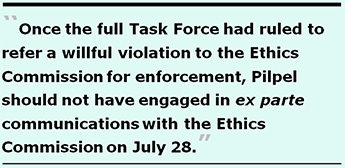 The Sunshine and
Ethics training provided by the City Attorney’s office in
the “Sunshine & Ethics Training Video”
from 2014 on the City Attorney’s web site that Mr. Pilpel
is required to have watched as part of his annual and bi-annual
filings, indicates that boards and commissions such as the Sunshine
Task Force may act like an adjudicative court, and must protect
the parties due process rights. Commissioners — and members
of the Sunshine Task Force — must act like judges, including
following procedural rules such as bans on ex parte communications.
The Sunshine and
Ethics training provided by the City Attorney’s office in
the “Sunshine & Ethics Training Video”
from 2014 on the City Attorney’s web site that Mr. Pilpel
is required to have watched as part of his annual and bi-annual
filings, indicates that boards and commissions such as the Sunshine
Task Force may act like an adjudicative court, and must protect
the parties due process rights. Commissioners — and members
of the Sunshine Task Force — must act like judges, including
following procedural rules such as bans on ex parte communications.
Pilpel’s ex parte communications to the Ethics Commission does not illustrate to Sunshine complainants that he is unbiased, nor do they illustrate that he will be a fair “judge” hearing current or future Sunshine complaints.
The Ethics Commission Executive Director’s dismissal of the second SIA complaint also did not address prohibitions against ex parte communications.
To the extent that Pilpel testified to the Ethics Commission on July 28 regarding the Ringel vs. Planning Department Sunshine complaint — whether as a member of SOTF or as a member of the public — he was clearly engaging in providing advice to the Ethics Commission (as an entity) concerning a Sunshine complaint that may appear again before the Task Force, which is clearly a matter that falls inside the scope of his duties as a member of the Task Force.
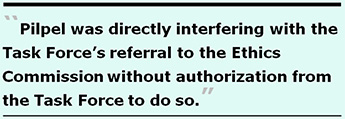 Since the Task Force
will, in fact, discuss how to respond to the Ethics Commission’s
request for “further factual information” on the Maionchi
case at its September special meeting, Pilpel should rescue himself
from the discussion and voting, given his April 28 ex parte
communications to Ethics concerning a case returned to the Task
Force that falls inside the scope of his duties.
Since the Task Force
will, in fact, discuss how to respond to the Ethics Commission’s
request for “further factual information” on the Maionchi
case at its September special meeting, Pilpel should rescue himself
from the discussion and voting, given his April 28 ex parte
communications to Ethics concerning a case returned to the Task
Force that falls inside the scope of his duties.
When Pilpel testified on July 28, he appears to have either concealed information or possibly misled the Commission. Pilpel failed to inform the Ethics Commission on July 28 that during a Task Force committee meeting on January 13, 2014 he had voted in support of a motion to refer the Ringel case back to the full Task Force’s jurisdiction, which passed 3 to 0. Pilpel also failed to inform the Ethics Commission on July 28, that on February 5, 2014 a motion was introduced during a full Task Force hearing to find John Rahaim, Director of the Planning Department, in violation of the Sunshine Ordinance for willful failure to comply with the Sunshine Ordinance Task Force’s Order of Determination dated October 23, 2013, and to refer Sunshine Complaint 13-024 to the Ethics Commission on a vote of 7 to 1, with Pilpel being the lone dissenter.
 Once the full Task
Force had ruled to refer a willful violation to the Ethics Commission
for enforcement, Pilpel should not have engaged in ex parte
communications with the Ethics Commission on July 28 by arguing
during his testimony that the wrong “actor” had been
named by the Task Force in the Ringel referral to Ethics
and seeking to substitute his minority opinion for the majority
opinion of the full Task Force’s decision.
Once the full Task
Force had ruled to refer a willful violation to the Ethics Commission
for enforcement, Pilpel should not have engaged in ex parte
communications with the Ethics Commission on July 28 by arguing
during his testimony that the wrong “actor” had been
named by the Task Force in the Ringel referral to Ethics
and seeking to substitute his minority opinion for the majority
opinion of the full Task Force’s decision.
Due to potential improprieties in St. Croix’s August 13 dismissal of Pilpel’s probable second SIA violation, an appeal of the dismissal will be submitted to the Ethics Commission at its September 22 meeting.
Censuring Pilpel
One former Chairperson of the Task Force who spoke on condition of anonymity noted: “I am more and more convinced that censuring Pilpel is something the Task Force should seriously consider. He appears to be attempting to sabotage the Task Force before the Ethics Commission.”
A second former Chairperson of the Task Force who also spoke on condition of anonymity observes:
 It is thought the
Task Force may soon consider whether to censure Pilpel. If they
do, he will earn the distinction of being the sole member of the
Task Force across its 20-year history to be considered for censure.
It is thought the
Task Force may soon consider whether to censure Pilpel. If they
do, he will earn the distinction of being the sole member of the
Task Force across its 20-year history to be considered for censure.
Starving the Sunshine Task Force
One of the quickest ways City government uses to silence its critics is to reduce budgets. That may explain why the Sunshine Task Force appears to function on a shoestring budget of less than $200,000 to $300,000 annually, which stands in stark contrast to the $2.2 million to $2.6 million Ethics Commission budget².
So it came as little surprise when the City attorney assigned to the Sunshine Task Force, Deputy City Attorney Nicholas Colla, announced during the Task Force’s July 22, 2014 meeting that beginning in August, his superiors were reducing his hours to provide legal advice to the Task Force, that he would no longer be attending the Task Force’s occasional second “special meeting” in any given month, and would only attend the Task Force’s regularly scheduled meetings, given budget concerns.
This sudden change came as a surprise to the Task Force members, and strangely, the news was not reported in the Task Force’s July 22 meeting minutes.
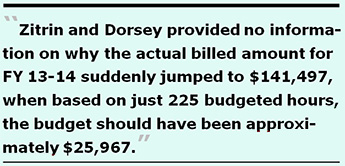 But it’s surprising,
in part, because approximately two years ago, this reporter bumped
into City Attorney Dennis Herrera in the lobby of City Hall while
talking with Westside neighborhood leader George Wooding. When
asked in 2012 whether he would work at strengthening the Sunshine
Task Force, Herrera replied that the Task Force’s biggest
problem was its minuscule budget.
But it’s surprising,
in part, because approximately two years ago, this reporter bumped
into City Attorney Dennis Herrera in the lobby of City Hall while
talking with Westside neighborhood leader George Wooding. When
asked in 2012 whether he would work at strengthening the Sunshine
Task Force, Herrera replied that the Task Force’s biggest
problem was its minuscule budget.
The Task Force does not have its own City budget. Instead, it relies on ”work order“ support from the Board of Supervisors for clerical and administrative support, and from the City Attorney’s Office for legal advice. Ironically, efforts to obtain the actual budgeted dollar amount provided to support the Task Force have been stymied by the City Attorney’s Office itself.
Although Clerk of the Board Angela Calvillo promptly responded on July 29 to a records request placed on July 27 by providing the requested budget data for the current year (FY 14–15) and the previous two fiscal years (FY 12–13 and FY 13–14), the City Attorney’s Office has failed to produce similar requested public records.
Despite seven e-mails to Dennis Herrera’s press secretary, lawyer Matt Dorsey, beginning on July 27 and eight e-mails to Gabriel Zitrin — who has a City Job Classification code of 8150, Claims Investigator but uses a working job title of “Deputy Communications Director” for the City Attorney’s Office — a complete response to a relatively simple records request remains incomplete six weeks after placing the initial request.
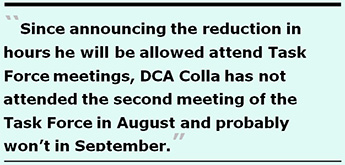 Zitrin’s first
response provided not budgeted data, but actual billed dollar
amounts. When subsequently asked to provide budgeted hours and
budgeted dollar amounts as initially requested, Zitrin eventually
provided in a second
response just budgeted attorney hours without the budgeted
dollar amount, with no information on how to convert the budgeted
hours to budgeted dollars, and failed to include budgeted hours
for FY 14–15.
Zitrin’s first
response provided not budgeted data, but actual billed dollar
amounts. When subsequently asked to provide budgeted hours and
budgeted dollar amounts as initially requested, Zitrin eventually
provided in a second
response just budgeted attorney hours without the budgeted
dollar amount, with no information on how to convert the budgeted
hours to budgeted dollars, and failed to include budgeted hours
for FY 14–15.
Based on calculating budgeted hours for the City Attorney, it appears SOTF’s budget for FY 13–14 was just $156,253:

Zitrin and Dorsey provided no explanation regarding why the actual
billed hours for both FY 12–13 and FY13–14 exceeded
the budgeted hours significantly, and they failed to explain two
months into the current FY that began July 1, 2014 why the City
Attorney is reporting budgeted hours to support the SOTF as still
“To Be Determined”:

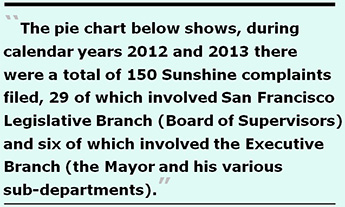 Of interest, Table
2 show, the City Attorney’s actual billed dollar amount to
support the Task Force dropped dramatically in FY 12–13 to
just $68,576, in large measure due to the six-month period in
which the Task Force was unable to meet because the Board of Supervisors
had failed to appoint a disabled member to the Task Force. Zitrin
and Dorsey provided no information as to why the actual billed
dollar amount for FY 13–14 jumped to $141,497, nearly $50,000
higher than in FY 11–12.
Of interest, Table
2 show, the City Attorney’s actual billed dollar amount to
support the Task Force dropped dramatically in FY 12–13 to
just $68,576, in large measure due to the six-month period in
which the Task Force was unable to meet because the Board of Supervisors
had failed to appoint a disabled member to the Task Force. Zitrin
and Dorsey provided no information as to why the actual billed
dollar amount for FY 13–14 jumped to $141,497, nearly $50,000
higher than in FY 11–12.
The Deputy City Attorney (DCA) assigned to the Task Force has two functions:
First, to provide legal advice orally during Sunshine Task Force meetings. There was just one additional “special meeting” held in FY 13–14, in addition to the 12 regular meetings. There was no appreciable increase in the number of meetings between FY 11–12 and FY 13–14 to justify a $50,000 increase in actual budgeted hours for City Attorney advice to the Task Force during its meetings.
The DCA’s second function is to assess each Sunshine complaint filed and prepare an instructional memo for the Task Force outlining legal issues involved in each complaint prior to an SOTF hearing on a complaint. Additionally, the DCA is occasionally asked by the Task Force to research and report back on legal issues, but this function in rare.
Zitrin and Dorsey provided no information on why the actual billed amount for FY 13–14 suddenly jumped to $141,497, when based on just 225 budgeted hours, the budget should have been approximately $25,967, as shown in Table 1. They also provided no information on why the 225 budgeted hours for FY 13–14 soared to 658 hours, 433 hours higher than budgeted.
And Zitrin and Dorsey provided no explanation as to why the actual billed hours for FY 13–14 was 221 hours higher than in FY 11–12, or what required 658 DCA billed hours in FY 13–14.
Since announcing the reduction in hours he will be allowed attend Task Force meetings, DCA Colla has not attended the second meeting of the Task Force in August and probably won’t in September, and has been observed during the Task Force’s regular meetings on August 6 and September 3 to leave the meetings at around 9:00 p.m., prior to meeting adjournment. The cutback in his support to the Task Force appears to be restricted to approximately five hours per meeting.
The $50,000 increase in actual billed dollars between FY 11–12 and FY 13–14 to just $141,497 in City Attorney time to support the SOTF pales in comparison to the $41.1 million in total pay (including overtime) paid to City Attorney staff (excluding fringe benefits) in Calendar Year 2013. The $50,000 increase is a drop in Herrera’s $41 million salaries bucket.
Rather than expanding the Task Force’s budget, City Attorney Dennis Herrera appears to be starving SOTF’s budgeted support. But why would he do that?
Analysis of
Sunshin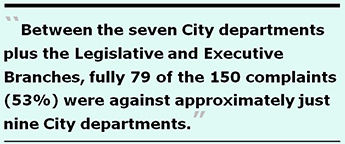 e Complaints
e Complaints
One possible answer to why the City may be further starving SOTF’s budget may be explained by the number of Sunshine complaints filed with the Task Force, even though the SOTF has no control over how many complaints against City departments are filed each year.
As the pie chart below shows, during calendar years 2012 and 2013 there were a total of 150 Sunshine complaints filed, 29 of which involved San Francisco Legislative Branch (Board of Supervisors) and six of which involved the Executive Branch (the Mayor and his various sub-departments). Between them, the Legislative and Executive Branches received nearly one-quarter of Sunshine complaints filed.
Add on to that the 14 Sunshine complaints filed against the City Attorney or the City Attorney’s Office, which push the total to 49 complaints between the City Attorney and Legislative and Executive Branches, well over one-third of the complaints.
Then, another 30 complaints were filed against the MTA, MTA’s Board of Directors, and five other City Departments who each had four or more Sunshine complaints filed against them.
Between the seven City departments — the City Attorney’s Office, MTA, the Public Library and its Library Commission, the City Controller’s Office, the Community Housing Partnership, Department of Public Works, and the Recreation and Parks Department — plus the Legislative and Executive Branches, fully 79 of the 150 complaints (53%) were against approximately just nine City departments.
By way of contrast, the remaining 71 complaints (47% of 150) were spread across 30 other City departments.
Although the Task Force has no control over how many Sunshine Ordinance complaints are filed, or against which City departments, it appears the Task Force is being starved of budgeted resources to deal with the caseload of complaints.
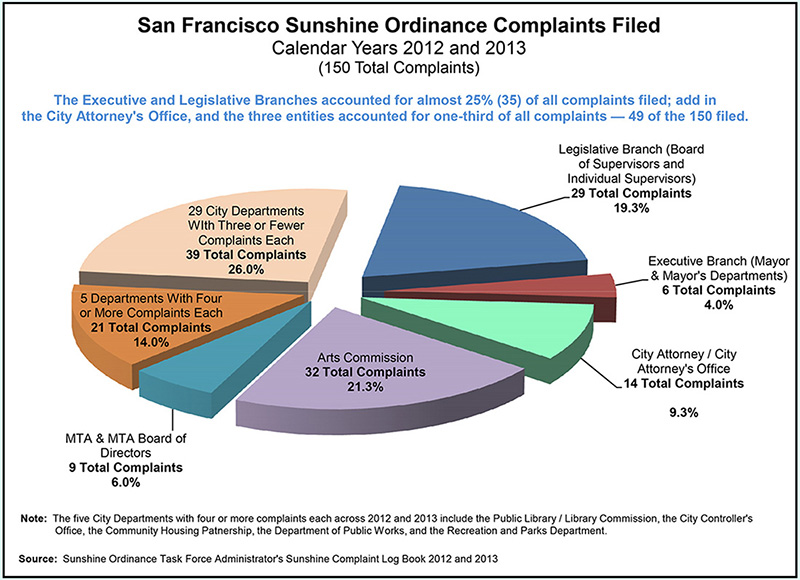
 While the Ethics
Commission now seems to be taking back some of its oversight responsibilities
and appear to be reigning in Mr. St. Croix somewhat, the problem
of Task Force member David Pilpel violating ex parte communications
restrictions remains. Both the Ethics Commission and the Sunshine
Task Force need to reign in Pilpel, and implement Civil Grand
Jury recommendations.
While the Ethics
Commission now seems to be taking back some of its oversight responsibilities
and appear to be reigning in Mr. St. Croix somewhat, the problem
of Task Force member David Pilpel violating ex parte communications
restrictions remains. Both the Ethics Commission and the Sunshine
Task Force need to reign in Pilpel, and implement Civil Grand
Jury recommendations.
The City desperately needs to increase budgeted support to
the Sunshine Task Force. After all, budgeting $200,000 to $300,000
to support the Task Force annually, while providing $2.6 million
to the Ethics Commission, is clearly inequitable.
¹ Government Code 34090 is contained in California's
Title IV "Government of Cities," Division 1 "Cities
Generally," Article 4, "Miscellaneous."
² The Ethics Commission's annual budget hovers at
$4.5 million, a significant portion of which is dedicated to public
financing of campaigns; the Ethics Commission's actual operating
budget for FY 12-13 was $2,256,239, and is $2,625,384 for FY 14-15.
Monette-Shaw is an open-government accountability advocate, a patient advocate, and a member of California’s First Amendment Coalition. He received the Society of Professional Journalists-Northern California Chapter’s James Madison Freedom of Information Award in the Advocacy category in March 2012. Feedback: monette-shaw@westsideobserver.com.